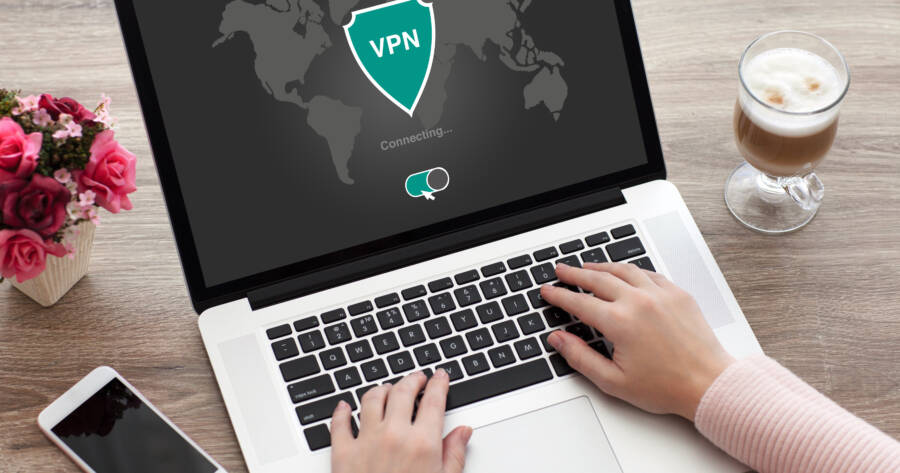A Virtual Private Network (VPN) redirects Internet traffic through dedicated servers, allowing users to funnel their online activities through specific geographic locations. This enables access to region-locked content and adds an extra layer of privacy. Additionally, VPNs connect workstations and devices to private, commercial IT networks securely, making them valuable for businesses that need remote access to secure systems and sensitive information while protecting data from cyber threats.
How Do VPNs Work?
VPNs come in many different formats, from ‘site-to-site’ VPNs that link offices together in different regions on the same local network, to Secure Socket Layer (SSL) connections used by companies to connect remote workforces together across the globe.
Standard VPNs used by regular Internet users operate through a complex set of interactions between your computer or mobile device (the ‘client’), a VPN server and your Internet Service Provider (ISP). Your computer initiates a connection with the VPN server via the Internet. Once that connection has been established, instead of your ISP assigning you an IP address (a unique number that identifies your computer on the Internet), the VPN server allocates it instead and becomes the funnel through which data is transferred to your machine.
Modern VPN Features
1. Killswitches
A VPN killswitch is a security measures that disconnects your computer or mobile device from the Internet if your VPN connection drops, preventing your IP from being published in the event your VPN tunnel is no longer active.
2. Double encryption
Double encryption technology, as the name suggests, ensures that your data runs through two VPN servers and is encrypted twice – once when data reaches the first VPN server and again before it arrives at another VPN server, where it’s decrypted and processed.
3. Jurisdiction and location
The laws and regulations that VPN companies must adhere to is dictated by the country that the VPN service is registered in. This may not seem all that relevant for common users, but an application that resides in the U.S. will inevitably be subject to a more stringent set of laws than those that are registered in Central America or The Netherlands, for example.
4. Multiple device support
Early VPNs were only able to support workstations and servers. Nowadays, modern VPN applications are compatible with a broad range of operating systems across multiple devices – desktops, laptops, mobile phones and tablets.
5. WiFi security
You may not have thought about it before, but public wireless access points are notoriously unsecure. When your device uses a public hotspot to connect to the Internet, hackers or irresponsible companies can extract all kinds of information from the device you’re using, based on its IP address. Using a VPN provides you with anonymity and masks your identity when you’re browsing on the go.
Commercial vs. Consumer VPNs
The term ‘VPN’ is a catch-all definition for any private networking solution that masks an IP address, but there are important distinctions to be made.
If you’re a business owner looking to network offices together or provide employees with VPN access to your servers from their homes to facilitate remote working, the VPN software you use will largely be dictated by what kind of firewalls and routers you use, rather than independent software applications.
Top VPN Applications
1. NordVPN
Best overall
NordVPN has risen from humble roots to become the most popular consumer VPN brand available in what has been a consistently crowded marketplace. NordVPN benefits from higher-than-average speeds across 6 simultaneous connections, with very little intermittency. The company did suffer a minor security scare when one of its Finland servers was accessed without authorisation, but since then the company has remained a popular choice for VPN subscribers all over the world.
2. ExpressVPN
Runner up overall
Founded by two Pennsylvania tech entrepreneurs, ExpressVPN seems to be in a perpetual battle with NordVPN for top spot in the consumer VPN rankings year-over-year. ExpressVPN arguably had the upper hand last year when it won several Editor’s Choice awards across several tech media platforms, but there’s very little difference between the two in terms of functionality, speed and security.
3. Surfshark
Best value
Surfshark began as a VPN service for iOS devices, but has since branched out to all major operating systems and device platforms. Surfshark’s two main selling points are its usability and price – it’s GUI is far and away the easiest to use of all the products mentioned here and its yearly subscription options make it the cheapest big-name VPN platform available, outside of free subscription models. The platform is also noted for minimal speed losses and year-on-year improvements in general connectivity.
4. ProtonVPN
Best for security and transparency
ProtonVPN was developed in Switzerland, by Proton Technologies AG – a team of computer scientists from the CERN research facility in Geneva. The company owns and operates all of its own VPN servers and is cross-compatible with all major OS platforms including Windows, MacOS, Android, and iOS. The software is renowned for its watertight security standards, high levels of transparency and open-source platform.
5. IPVanish
Best to support U.S. company
IPVanish started out as a subsidiary of the Orlando-based Highwinds Group. The company distinguishes itself by owning most of its own access points and communications infrastructure, allowing it to exercise significant control over its network with an unlimited number of simultaneous connections allowed. The platform was accused of handing over subscriber data to authorities, but has since undergone a managerial change who have pledged to upholding user anonymity.
Choosing a Provider
As with all other consumer technology platforms, how you choose a VPN provider should be dictated by what you need it for. If you’re someone who is just looking to browse Netflix from a different geographical region, then the likelihood is that you simply need a cheap, verifiable application that can get the job done, without the need for expensive security features or complex front-end functionality. Whatever your reason, VPNs are there to make the Internet more accessible and easier to use.
